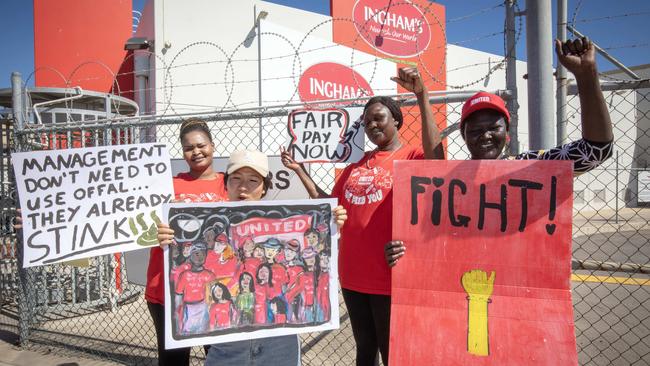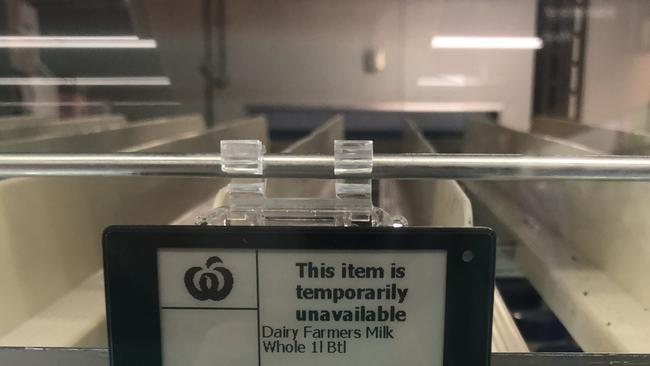Rolling strikes smash Australia’s food sector as food prices rise
Multiple strikes have broken out across Australia’s food sector, putting more pressure on an industry rocked by surging inflation. But experts have cautioned labour is not to blame for rising grocery bills at the checkout.

Breaking News
Don't miss out on the headlines from Breaking News. Followed categories will be added to My News.
Australia’s food sector in the middle of an inflation crisis that has pushed up the cost of staple goods by more than 10 per cent in just a year is now being rocked by industrial action.
But experts say the rolling unrest, while disruptive, is unlikely to have a substantial effect on prices at the checkout for most consumers.
In September, United Workers Union members pursued stoppages at ASX-listed Ingham’s chicken plants in South Australia and Western Australia.
Ingham’s supplies chicken to major brands such as McDonald’s, KFC and Woolworths, and KFC put out a statement reassuring customers it had put in place “contingency plans” to maintain supply to its stores.
The strike ended with a new enterprise agreement between the poultry producer and the union with a 13.12 per cent pay bump over three years.
Just days later, Bega workers at the company’s Penrith factory in western Sydney walked off the job.
Bega produces products such as Bega cheese and Dare iced coffee, with the strike causing temporary shortages in the popular cold coffee drink.

Earlier this month, Retail and Fast Food Workers Union members at supermarket behemoths Coles and Woolworths walked off the job for two hours at 10m to protest what the union has branded “poverty wages”.
“The dirty little Coles and Woolies secret is that those workers are paid poverty wages – among the lowest in Australia,” the RAFFWU says.
“They have unsafe workplaces where abuse, assaults, threats and harassment are a daily reality and their jobs are insecure.”
It was be the first-ever national strike to hit the country, with stores in NSW, Victoria, Queensland, Western Australia, South Australia and the ACT affected.
A Coles spokesman said the company did not see any disruption to customers from the strike.
“Tens of thousands of team members across our stores continued to serve our customers. Around 20 Coles team members nationally participated in Saturday’s stop work action.
“Coles has held regular meetings with the bargaining representative and remains committed to negotiating a fair agreement for all,” a spokesman told NCA NewsWire.
“Coles continues to provide above-award conditions under our current enterprise agreement and passed on the Fair Work Commission’s 5.75 per cent annual wage increase to our supermarket team members in July 2023.
“We dispute misinformation being pushed by the bargaining representative, which is not a registered trade union and represents 0.34 per cent of our total workforce of 120,000 people.”
Woolworths, meanwhile, said only 300 of its 132,000 staff were expected to take part in the walk-off.
The concentrated industrial action comes just weeks after the Australian Bureau of Statistics reported a substantial rise in food prices across 2022 into 2023, part of a broader cost-of-living crisis bearing down on Australians.
From the June quarter of 2022 through to the June quarter of 2023, food and beverage prices rose 7.5 per cent.
But some items skyrocketed by more than 10 per cent.
Bread and cereal products are up by 11.6 per cent from mid 2022 and dairy products are up 15.2 per cent.
University of Queensland Professor John Quiggin said market forces external to Australia were to blame for the price shock.
“World prices for wheat and dairy products rose to very high levels in 2022,” he said.
“Since Australia trades on world markets, that gets transmitted, with a time-lag to Australian consumers.
“Prices have been falling for most of this year, so we may get better news soon.”
He added industrial action in the food sector was “mostly symbolic” at this stage and said the Coles and Woolworths strike would not affect grocery prices for most consumers, even if there was a large increases in wages.
“Brief strikes such as the two-hour stoppage by supermarket workers won’t have much impact on supply chains,” he said.
“Wage costs paid by supermarkets represent around 20 per cent of the prices faced by consumers, so even a large increase in wage rates won’t have a huge impact in price.
“Supermarkets should be able to absorb an increase given their high profits.”

QUT marketing and consumer behaviour researcher Professor Gary Mortimer said long-term strikes in the food sector could move prices, but the kind of industrial action that has hit Australia in the spring would not have an impact.
“It would require workers at every supplier and every producer to go on strike for months,” he said.
He also noted the food sector had multiple businesses supplying goods.
He said other sectors, such as airlines with only a limited range of major companies, were more exposed to strike action.
Coles and Woolworths were asked how they maintained food security in the face of industrial unrest, but neither wished to provide an on-the-record response.
But while food prices have risen sharply and unrest is spreading, University of Western Australia economics Professor Alison Preston expects inflation in the sector to cool in the coming months.
“Food annual inflation has been easing in recent times,” she said.
More Coverage
Originally published as Rolling strikes smash Australia’s food sector as food prices rise





